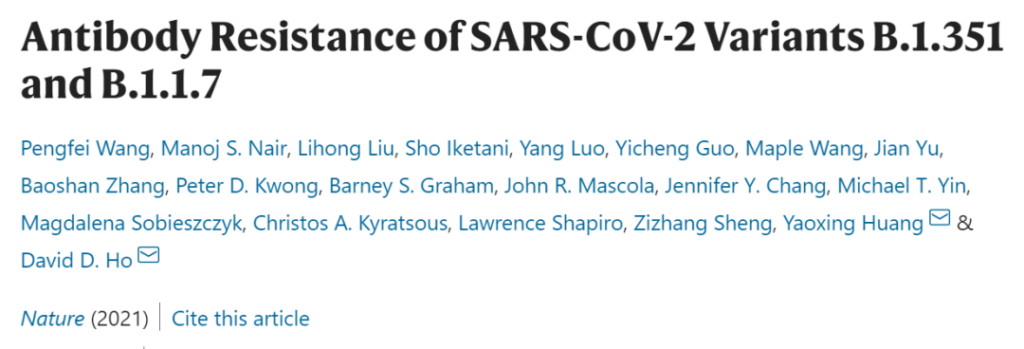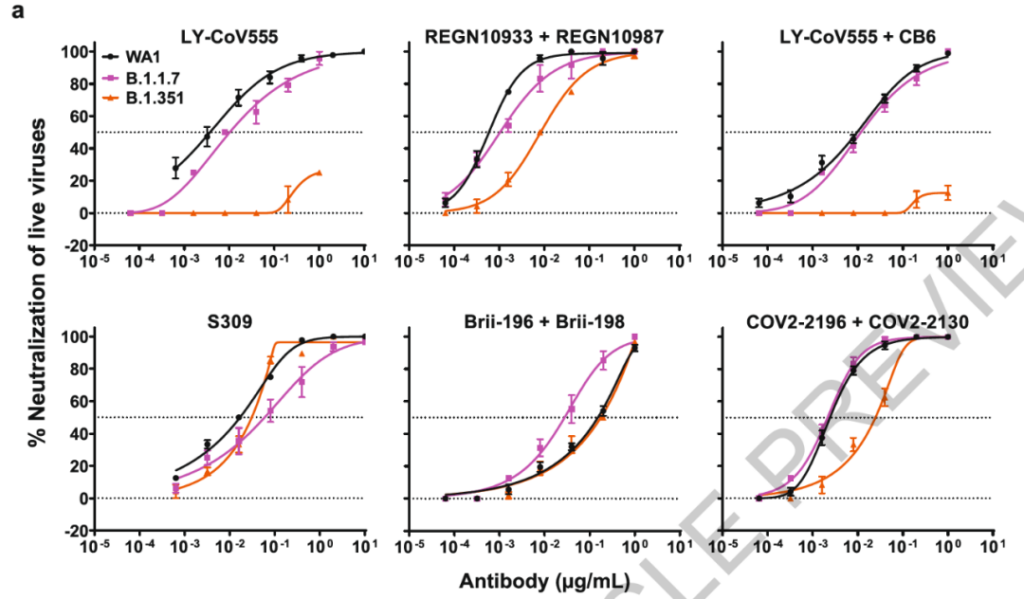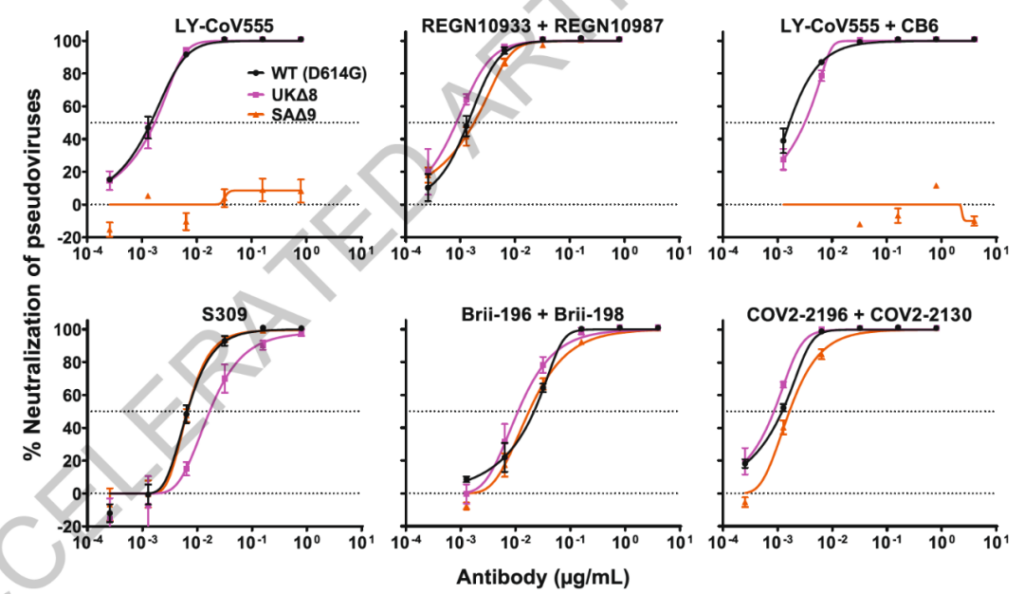Nature: Antibody cocktail can effectively deal with COVID-19 mutants
- Normal Liver Cells Found to Promote Cancer Metastasis to the Liver
- Nearly 80% Complete Remission: Breakthrough in ADC Anti-Tumor Treatment
- Vaccination Against Common Diseases May Prevent Dementia!
- New Alzheimer’s Disease (AD) Diagnosis and Staging Criteria
- Breakthrough in Alzheimer’s Disease: New Nasal Spray Halts Cognitive Decline by Targeting Toxic Protein
- Can the Tap Water at the Paris Olympics be Drunk Directly?
Nature: Antibody cocktail can effectively deal with COVID-19 mutants
Nature: Antibody cocktail can effectively deal with COVID-19 mutants. “The person who beat AIDS”: Dr. David Ho, published a Nature paper, confirming that the antibody cocktail can effectively deal with the COVID-19 mutants.

The COVID-19 pneumonia pandemic has swept the world, and its pathogen, the COVID-19 virus (SARS-CoV-2), is still raging in many countries and regions around the world. Ending this pandemic depends on the development of effective interventions.
Single monoclonal antibodies and combined monoclonal antibody therapies have been urgently authorized by the FDA for the treatment of new coronavirus pneumonia, and authorized companies are also preparing for emergency production. In addition, a number of COVID-19 vaccine institutions have also been approved, have begun a large-scale vaccination, and have achieved remarkable results.
However, both therapeutic monoclonal antibodies and preventive vaccines were developed against the new coronavirus strain that broke out at the end of 2019.
The recently reported COVID-19 mutant strain B.1.1.7 that appeared in the UK and the COVID-19 mutant strain B.1.351 that appeared in South Africa have received widespread attention because these two new mutant strains have been found to be more transmissible and The spike protein (S protein) has a mutation.
On March 8, 2021, Nature published a research paper titled Antibody Resistance of SARS-CoV-2 Variants B.1.351 and B.1.1.7 by the Dr. David Ho team in the form of accelerated launch.
The study showed that the British mutant strain (B.1.1.7) and the South African mutant strain (B.1.351) can escape a variety of monoclonal antibodies that target the N-terminal domain (NTD) of the new coronavirus S protein, as well as target receptors Monoclonal antibody binding domain (RBD).
Finally, the research team found that the “antibody cocktail” therapy composed of different monoclonal antibodies can still effectively neutralize these COVID-19 mutants.

Specifically, the study showed that the British mutant strain (B.1.1.7) can escape most of the monoclonal antibodies that target the spike protein (S protein) of the new coronavirus, and that it has a small number of targeted receptor binding domains (RBD). Monoclonal antibodies are relatively resistant. Fortunately, the resistance of the mutant strain to the serum of recovered patients and mRNA vaccine recipients only slightly decreased.
However, the results of the South African mutant strain (B.1.351) are more worrying. The mutant strain can escape most of the monoclonal antibodies that target the new coronavirus spike protein (S protein) as well as multiple targeted receptors. Monoclonal antibody binding domain (RBD).
Finally, the research team found that the “antibody cocktail” therapy composed of different monoclonal antibodies can still effectively neutralize these COVID-19 mutants.


The study shows that with the development of the pandemic, more and more new coronavirus mutant strains appear, and many antibodies developed against the original virus strain may be less effective. Therefore, it is necessary to update antibody treatment strategies in real time.
More importantly, the study confirmed that the “antibody cocktail” therapy composed of different monoclonal antibodies can still effectively neutralize theseCOVID-19 mutant strains, providing an effective strategy for dealing with the COVID-19 mutant strain.
About Dr. David Ho
Speaking of Freshman Ho, one has to mention his greatest contribution-cocktail therapy. The application of cocktail therapy has made AIDS a chronic disease, and millions of AIDS patients have survived as a result. Dr. David Ho was also called “the one who defeated AIDS” by Time magazine.
Dr. David Ho, born in Taiwan, China on November 3, 1952, immigrated to Los Angeles, California with his family when he was 12 years old.
In 1970, He was admitted to the Massachusetts Institute of Technology in the United States, and four years later graduated with first-place honors, and then received a doctorate in medicine from Harvard University.
On June 5, 1981, the US Centers for Disease Control and Prevention released a report of 5 AIDS cases, which was the first time that AIDS was discovered in the world. At this time, Dayi He was working as an intern at the Sinai Medical Center, and he came into contact with the earliest AIDS cases.
Since then, Dr. David Ho devoted himself to AIDS research, becoming one of the first scientists in the world to realize that AIDS is caused by a virus, and one of the first scientists to clarify the diversity of HIV replication.
In 1996, in the face of the frequent emergence of drug resistance in AIDS patients, Dr. David Ho proposed the “cocktail therapy”, combining a variety of anti-AIDS drugs into a combination of protease inhibitor drugs and nucleoside reverse transcriptase inhibitors. The combination of non-nucleoside reverse transcriptase inhibitor drugs can treat AIDS more effectively than a single drug and is less prone to drug resistance.
Since its use in 1996, cocktail therapy has effectively reduced the mortality rate of AIDS patients, and it is still one of the most commonly used and most effective AIDS treatment methods.
Due to the outstanding contribution of “cocktail therapy” to the treatment of AIDS, Dr. David Ho was selected as “Time” Weekly Person of the Year in 1996. In 2010, “Time” Weekly was called “the person who defeated AIDS”.
Since then, Dr. David Ho has devoted himself to research on the prevention and treatment of AIDS and other viral diseases, and has achieved a series of important research results.
(source:internet, reference only)
Disclaimer of medicaltrend.org



